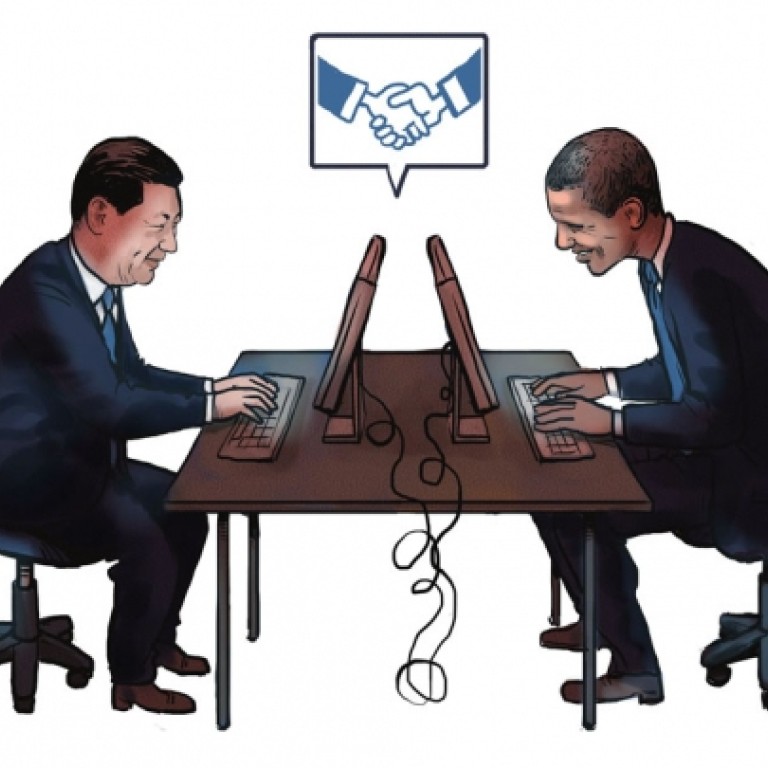
Thanks to Snowden, a chance to reset Sino-US relations
Lanxin Xiang says the fallout from Edward Snowden's revelations may not be as damaging to Sino-US ties as feared, but could instead provide an opportunity for recalibration
Edward Snowden seems to have opened a Pandora's box. Unlike WikiLeaks, which has released official documents - often banal conversations between government bureaucrats - Snowden has exposed the operation of the world's most powerful state-sponsored cyberespionage of a community that most prizes individual freedom. Hero or not, Snowden will go down in history as a whistle-blower who triggered a moral earthquake which few individuals in the world can escape.
This is the cyberversion of George Orwell's .
Given that Hong Kong was Snowden's first choice of destination, most commentators seem to believe that the leaks have done great damage to US-China relations, which were only recently "reheated" at the Sunnylands summit in California. But the contrary may also be true.
First, there was little meeting of minds at the summit. The key Chinese preoccupations didn't match those of the White House. The Chinese wanted a consensus with the US over the meaning and content of a "new type of great power relations", while the United States, prior to the summit, was very much in the mood of avoiding another Peloponnesian War, a democratic Athens versus the military-authoritarian regime of Sparta.
Admittedly, the logic of this "new type" of relationship sounds rather old-fashioned, starting with the premise of a global power shift, and ending with the demand for recognition of equal status with the US. The US government refused to take it seriously. Moreover, another favourite theme of President Xi Jinping , the "China dream", was also met with disdain. President Barack Obama seemed unwilling to entertain Xi's claim that the Chinese and American dreams have something in common.
Post summit, Xi's greatest victory was to repel the attack by the US government on alleged Chinese cyberespionage, albeit with more than a little luck. The timing of Snowden's revelations disrupted the American strategy. The fallout will last a long time and will shield China from similar accusations for a while. The immediate impact is clear: the US is losing the moral high ground in the eyes of its own people and people all over the world.
There is at least one striking revelation: the US, the world's only superpower, while accusing other countries of preparing for cyberwar, has been on a sort of cyberwar footing for quite some time. The Prism project has, after all, been carried out by the US military.
Two rationales seem to have buttressed the US government's decision to treat cybercommunication as a major war zone. The first is provided by the September 11 terrorist attacks. As long as the US government considers its fight against terrorism a "war", the cyberwar will have no legal or operational limitations. The second is that the US government has always been obsessed with the logic of the rise and fall of great powers. For the only superpower to maintain its top position, technological superiority has to be a priority.
Like nuclear technology, cybertechnology is also a dual-use technology. It has the potential to release even greater destructive power than nuclear weapons. With a perennial mentality of great power conflict, a cyberwar footing is thus necessary to prepare for a future showdown with potential challengers.
Throughout modern military history, superior technological devices for military reconnaissance or espionage were more often than not transformed into attacking weapon systems. If one firmly believes that military conflict between a rising power and existing power is inevitable, then it's not entirely wrong to prepare for a cyberwar. Weapon systems such as submarines, and the air force during the first world war, and carriers during the second world war, were initially envisioned as reconnaissance devices, but soon became powerful attacking weapons in actual warfare.
Cyberwar is of course quite different. Traditional weapons do not involve a citizen's daily routine; cyber devices are part of everyone's normal life. Hence, the Snowden affair has weaved together the human dilemmas in international and domestic politics, and prised open many moral dimensions of technological advances for societies.
Friedrich Nietzsche once said: "If you look into the abyss, it will also look back at you." Societies know the frightening aspects of technological advances, despite the convenience they also provide, but most of us prefer to close our eyes and not look into the abyss. Snowden has forced us to reflect seriously on the future of our cyberworld, at a time when there are no international rules on cyberactivities.
A salutary effect on US-China relations might be for both sides to reflect on the urgent need for establishing true strategic trust between the two leading powers.
On the one hand, the US has to tone down its attacks on Chinese cyber-activities and focus instead on how to reset relations with China on political, not purely military and geostrategic, premises.
On the other hand, the Chinese idea of a new type of relations might get a better hearing in Washington, despite the obvious lack of clarity on Beijing's side. In fact, Washington could work with Beijing to arrive at a mutually agreed definition of this relationship.
For the Chinese, the Snowden affair is a god-sent opportunity to firm up the elusive concept of a new type of relationship and engage the US on fundamental issues of mutual concern. The premature initiative of linking the Chinese dream to the American dream is going nowhere.
China must also take the initiative to engage the world in rule-setting actions over cyberactivities.
More importantly, China is hardly immune from accusations of cyber-monitoring its own citizens and for internet censorship. Beijing has no reason to be complacent; it's not inconceivable that a Chinese Snowden could emerge.
China must make a positive contribution not only to the global cause of preventing cybertechnology from becoming another weapon of mass destruction, but also to the cause of political and social transparency and reform.

